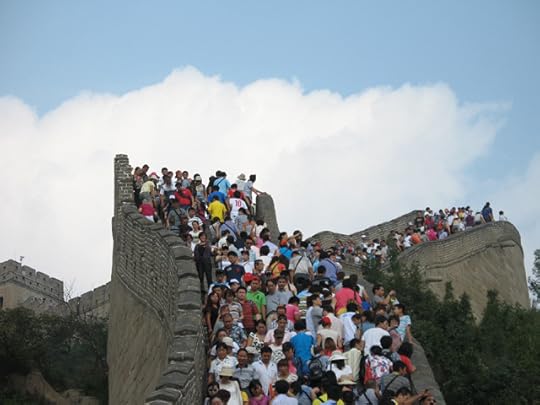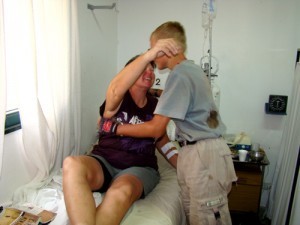Rolf Potts's Blog, page 106
February 24, 2012
Complete guide for American expats returning home
Vagablogging :: Rolf Potts Vagabonding Blog

Activists in Seattle mocking Black Friday sales. Photo: John Henderson / Flickr
Have you ever returned home, only to feel like home was more foreign than any of the exotic locales you've visited? You're not alone. Reverse culture shock has a way of ambushing people, despite how much you may have heard about it. When we travel, we have our awareness up. We know we must learn and adapt. But home? We let our guard down. We don't have to think too hard, because we're back on familiar ground. Or so we think.
CNNGO published the Ultimate checklist for returning U.S. expats. The article covers a wide range of topics, ranging from practical matters like money to more social niceties like pop culture. The writer is mostly tongue-in-cheek in tone, particularly the section on what's hot and what's not these days.
More sobering is the final section on reverse culture shock. Every one of the points resonated with me. Here's one excerpt:
Nobody cares where you've been
People outside the U.S. often like to hear what life is like there. Americans, owing to either a sense of superiority or disinterest, aren't all that curious about what's going on in Mamalikibooboostan.
This is why our Rolf Potts in Vagabonding emphasized that travel should be a personal decision, not to prove something to others. No one will care as much about your travels as you do.
I returned to the United States after five years of working and traveling in Asia. Like many, I was blindsided by the process of re-adapting. Here are some ways I've dealt with culture shock:
1) Use Skype. I still regularly chat with some of the close friends I've made while on the road. Talking to people with the same shared experiences has been a huge morale boost.
2) Make new friends. I've been active on Meetup.com, joining groups that match my interests.
3) Attend travel meetups. Events like Meet Plan Go and Couchsurfing meetups are great ways to meet travelers where you live.
Did you experience reverse culture shock when you returned home? Where had you been living and traveling before then? What did you do to cope? Please share your stories in the comments.
Original article can be found here: Complete guide for American expats returning home
February 23, 2012
One billion tourists around the world in 2012
Vagablogging :: Rolf Potts Vagabonding Blog
Last week I discovered that, according to an article published on CNNgo's website, one billion tourists are expected to hit the world's roads in 2012. With the steady wealth increase of colossus countries China and India, an incredible number of people are going to test the existent infrastructures and push several countries around the world to achieve "tourism excellence".

picture taken from http://chinatravelgo.com
Hundreds of sites around the world, from Angkor Wat to the Coliseum to the Iguazu Falls, are going to be assaulted by hordes of camera toting, sunglass-faced individuals ready to fight tooth and nail to secure the best position for that unforgettable sunrise picture spot. Every experience will be most probably overcrowded and overpriced, museumifying the most beautiful places across hundreds of countries, leveling every experience to appalling, standardized, must-see-must-do checklists.
Until the end of the article, the word "tourist" was constantly used. And this led me to sit back, and think. Who are the tourists, really?
Of course, we may think of those groups of people following a colorful flag-toting tour guide, queuing up in a neat line at the sound of a whistle in front of a ticket office. We would certainly exclude our own group from such a trivial definition, the "tourist".
Nevertheless, as vagabonds with more or less travel experiences under our belts, as people striving to find the unexpected, linger longer, transform trips into life stories… what are we? After all, travelers aren't just another sub category of the wider "tourist" umbrella definition?
No hostel? No cheap guesthouse? No internet and overseas call shop? No Coca Cola? Ok, so it is probably not worth going there: we won't be able to use our Iphones and get 3G connections to be in touch with the world back home. Our Facebook won't work. Places that are not listed in any guidebook, or in the UNESCO heritage list. Oh. My. Gosh. Why do we want to go there?
For many travelers in the past, the attraction to the unknown has been the push factor to get out and discover the world. Sailors, explorers and fools have roamed the four corners of this muddy globe creating the maps and the lines generating the tourism industry. But these days, in an ever more interconnected and accessible reality, it seems like the word "unknown" had ceased to exist. Adventure has been lost sandwiched between the bus ride and the comfortable search for the umpteenth similar guesthouse in yet another backpacker ghetto.
There should be a subtle difference between tourists and travelers; a difference getting the first category invariably "lost" in unknown territories, enjoying the experience.
The rush to thick off the entire tourist sites on any map, to complete the same itineraries and go wherever we will be able to experience the "must see" places seems to greatly diverge from a genuine feeling of discovery. As I see daily around myself, travelers and tourists are walking on the very same thin line: going to the same destinations, using different kinds of transportation maybe, but always on guard when a real experience is approaching.
Receptiveness and adaptation are, in my opinion, what starts making the difference between an indie traveller and a "tourist".
Because making it cheaper does not necessarily mean making it different.
Ultimately, if the world is bound to receive one billion tourists this year, I may just hope that a small percentage will take time stop and reflect, wherever they may be, and finally GET LOST. Adventure is definitely still out there, if we are willing to open our eyes and look properly for it. Do you agree?
For those who don't, fear not: the tourist trail is a well trodden path, waiting for you, and about another billion souls.
Original article can be found here: One billion tourists around the world in 2012
How to make traveling with Celiac Disease (a food allergy) easier
Vagablogging :: Rolf Potts Vagabonding Blog
Traveling with pre-existing food allergies can be daunting. It is like playing Russian roulette three times a day with meals. Living on the edge is part of the excitement of travel. Food experimentation however, is not a luxury you can afford if having a reaction on the road can be potentially dangerous. The good news is; recently there has been a rise in worldwide awareness of Celiac Disease.

No Gluten
For those unfamiliar with it, Celiac Disease is a digestive disease wherein one's body cannot process gluten proteins. Exposure to these gluten proteins (through ingestion or direct contact with the skin) sets off a negative chain of reactions that may affect many areas of the body. It makes eating out and shopping for food in your own country an adventure!
What if you're going where you don't speak or can't read the native language you say? A little forethought and the following resources can help.
Celiac Travel has cards in 51 different languages that you can print out and easily hand to a friend, wait staff, or chef explaining your allergy.
Gluten Free Passport offers a plethora of links and resources across the globe.
You can take along an ELISA test and become your own mad scientist. Granted…the kits are slightly expensive. When you weigh the difference, however, between spending money on prevention or missing a day of walking around exploring, the dollar amount may prove highly worth it.
Also man's best friend is presently being trained to sniff its way onto the prevention scene with Gluten-Detection Service Dogs, which are currently being trained in Slovenia. If you are curious about these types of Service Dogs please contact me and I will be happy to share more details with you.
Do you know of any other great resources?
Original article can be found here: How to make traveling with Celiac Disease (a food allergy) easier
How to Make Traveling With Celiac Disease (a Food Allergy) Easier
Vagablogging :: Rolf Potts Vagabonding Blog
Traveling with pre-existing food allergies can be daunting. It is like playing Russian roulette three times a day with meals. Living on the edge is part of the excitement of travel. Food experimentation however, is not a luxury you can afford if having a reaction on the road can be potentially dangerous. The good news is; recently there has been a rise in worldwide awareness of Celiac Disease.

No Gluten
For those unfamiliar with it, Celiac Disease is a digestive disease wherein one's body cannot process gluten proteins. Exposure to these gluten proteins (through ingestion or direct contact with the skin) sets off a negative chain of reactions that may affect many areas of the body. It makes eating out and shopping for food in your own country an adventure!
What if you're going where you don't speak or can't read the native language you say? A little forethought and the following resources can help.
Celiac Travel has cards in 51 different languages that you can print out and easily hand to a friend, wait staff, or chef explaining your allergy.
Gluten Free Passport offers a plethora of links and resources across the globe.
You can take along an ELISA test and become your own mad scientist. Granted…the kits are slightly expensive. When you weigh the difference, however, between spending money on prevention or missing a day of walking around exploring, the dollar amount may prove highly worth it.
Also man's best friend is presently being trained to sniff its way onto the prevention scene with Gluten-Detection Service Dogs, which are currently being trained in Slovenia. If you are curious about these types of Service Dogs please contact me and I will be happy to share more details with you.
Do you know of any other great resources?
Original article can be found here: How to Make Traveling With Celiac Disease (a Food Allergy) Easier
February 22, 2012
Thinking about long-term travel? Here's where to get inspired
Vagablogging :: Rolf Potts Vagabonding Blog
It was a 10-year process for me. Back and forth. Up and down. Should I do this, really? The decision to finally follow the dream of long-term travel is a difficult one, especially for those of us with an established career and lifestyle.
For me, the decision-making process was all happening in my own head, until I found some books and blogs that gave me the final boost of inspiration. These outlets provided a support group of sorts – helping me realize that there are many people out there doing this and that it's totally possible.
Since I've shared the news of my travel plans, I've come across several others who are in the place I was in for 10 years. Here are the books, blogs and organizations I recommend for that initial inspiration:
Vagabonding – Ok, this is clearly biased, but honestly this is the first thing I recommend to those who express interest in a traveling lifestyle. It's a quick read that captures the philosophy behind it all while also giving practical advice. Once I started reading, I couldn't put it down – which was my first sign that this is a true passion that I needed to explore.
Meet Plan Go – I didn't find this site until a few weeks before I left for my trip, but I wish I'd found it sooner. Aimed at those who are mid-career, Meet Plan Go organizes meetings in various cities for those interested in travel to network and learn. You can also join their online community and "basic training course" ($149) for help with determining if career break travel is right for you, expert advice on the preparation process and numerous other resources. Their Briefcase to Backpack blog provides helpful info for those in the contemplation stage as well as those in the "plan" and "go" stages.
Make Things Happen – Another organization I wish I'd found sooner, Making Things Happen is not specifically travel-focused but rather aimes to help anyone with a goal to finally take the steps toward making it happen. They organize workshops throughout the U.S. to help people overcome their fears, discover their strengths, and get inspired to change their life. Although I didn't attend a workshop, I came across the Making Things Happen blog and found the quotes and articles inspiring during my planning process.
The Art of Nonconformity – This book, website and blog are written by Chris Guillebeau, a traveler with a goal of visiting every country in the world. His mission is to help people realize they don't need to live the way society expects, and that you live a fulfilling life by creating your own path whether in business or in lifestyle. I found myself going back to a few of his posts, including Why you should quit your job and travel the world and Ever feel like giving up?, several times throughout my decision-making and planning process.
Advanced Riskology – Tyler Tervooren focuses on embracing the unknown to learn and grow in life. His posts are thoughtful, detailed and motivational. I personally enjoyed A tale of two dreamers, about those who let life happen versus those who focus conciously on their goal.
This is by no means an exhaustive list, but they are the places I found most helpful. In addition to these outlets, simply reading the hundreds of personal travel blogs and forums out there can be inspiring in themselves. Together these sites helped me realize I wasn't totally crazy and that I had the power to make this happen for myself.
What are some of the other sites and books you find inspiring?
Original article can be found here: Thinking about long-term travel? Here's where to get inspired
February 21, 2012
Travel and treatment: a glimpse into medical tourism
Vagablogging :: Rolf Potts Vagabonding Blog
Nancy made some excellent points in her post about healthcare abroad. It's incredibly nerve-wracking to imagine serious injuries or illnesses away from home, and the fear often inhibits people from international travel.
Medical tourism, however, involves more than simply seeking treatment overseas in the case of an emergency. The idea that people can get a needed surgery (joint, cardiac, dental and cosmetic among the most popular) and combine it with vacation is turning travel abroad for treatment into a multi million dollar industry. 
Before taking off to Asia I envisioned a worst case scenario and thought – New York is only a 24 hour trip if I'm really in trouble. It took only a few days in Bangkok to realize that people travel 24 hours from New York to Thailand for excellent healthcare at a fraction of the price. In fact, Thailand is one of the most popular destinations for many surgeries. Combined with a pre-surgery week at the beach, medical tourism there can make for an incredible (and cost efficient) getaway.
Considering a colonoscopy, a coronary artery bypass, or even a brow lift? Love to travel? Join the millions of people who go out of their way to combine medicine with vacation. Medical tourism agencies like this one specialize in surgery packages, tour itineraries, resort stays and spa treatments during recovery.
Farooq Siddiqui of Qatar's Regency Travel & Tours suggests in the Bangkok Post that "The medical tourism industry in Thailand has room to grow" with many Middle Eastern patients. "Many rich Quataris like to have medical check-ups in Bangkok and stay at the JW Marriott, which offers a special rate to medical tourism clients." The Bumrungrad International Hospital, one of Bangkok's biggest, recorded 125,000 Arab patients in 2011.
Of course, don't go overboard in search of cheap treatments abroad. It's easy to get carried away by the notion of cheap surgery combined with travel, but procedures and recovery often come with catastrophic risks.
The dangers became clear after speaking to Miami plastic surgeon Dr. John Martin, who is no stranger to medical disasters abroad. He says that many patients leave the country thinking they're saving money, but actually spend much more than if they had gone under the knife at home. One of his patients combined vacation in Columbia with some plastic surgery, and had to return several times after a bad case of postoperative complications and infection. The procedure was significantly less expensive than its Miami equivalent, but the airfare, hotels and subsequent trips costed her much more than the surgery would have been at home.
"If you go abroad, make sure you're treated in a major city or near a near a major hospital," John Martin says. Complications on the way back from international treatments usually offset any financial benefit of "bargain shopping" for surgeries.
Looking to combine a root canal with some exotic site seeing? Make sure to do your research. I think for now I'll just stick with over the counter cold medicine and malaria pills from my Bangkok pharmacy.
Original article can be found here: Travel and treatment: a glimpse into medical tourism
What about medical issues while traveling abroad?
Vagablogging :: Rolf Potts Vagabonding Blog
I was talking with a friend the other day when she blurted out her biggest fear of traveling abroad. "What about medical issues? What do you do when something happens overseas?"

Hospitalized in Argentina for pneumonia
And I responded, "I go the hospital. They have doctors overseas too."
Medical concerns are a huge issue for sure. Nobody wants to face the possibility of a serious injury with no access to medical facilities.
I'll let you in on a little secret: they have doctors and hospitals overseas too. If people live there, there will be medical facilities – and many times, they'll be better and cheaper than what you would find in the good ol' US of A.
We've dealt with quite a few health crisis throughout the years. I broke my hand in Egypt, my son broke his arm in Malaysia. He suffered from pneumonia in Malaysia as well, while I waited until we got to Argentina to get it. My husband's heart went into arrhythmia and he had to be evacuated to Israel in an air ambulance. We've sought out clinics in dozens of countries around the globe for various maladies and always managed to find a doctor. Always.
In fact, I would even go so far as to say that many times I've gotten better care abroad than I would have at home. In Mexico a knee specialist came in to his office on Sunday solely to see me when my knee suddenly erupted into severe pain. I was sitting in front of a neurologist 45 minutes after my head exploded with an excruciating headache. An MRI can be scheduled within hours rather than the weeks or months it takes in the USA.
Is it scary to deal with health issues far away from family and friends? You bet. It's scary at home too, but having that support system in place makes it a bit more bearable.
But don't fear medical issues while traveling because of a lack of facilities. Because… well, that's not the way it is.
Original article can be found here: What about medical issues while traveling abroad?
February 20, 2012
Defining "Home"
Vagablogging :: Rolf Potts Vagabonding Blog

Monopoly houses | credit to ttaudigani
Literally speaking a home is a place of residence, a domicile, yet that hardly does justice to the true meaning of the word. Is anyone in the habit of believing that the two-man ultra-light tent they set up in Banff National Park's back-country or the garish and gaudy walls of the Pink Palace in Corfu resemble what "home" actually means to them? We pass through hotels and hostels, and often cities and countries, knowing that our time is limited and rarely establish what would normally be thought of as a home, at least not in the literal sense already mentioned, yet what we do establish are tangible and intangible connections; people and place and memories and familiarity. This begs the question, should our understanding of home be viewed as a literal or an abstract concept?
From the literal side, home is wherever we find ourselves. It's our address. Where we shower in the morning and where we lay weary heads down at night. It may be that hostel or hotel I mentioned earlier, but it's more likely to be the place where we get mail and cook meals and engage in all manner of idiosyncrasies. In contrast, the abstract definition of home is about feelings and memories. Where you grew up and the nostalgia you feel when you think back on your childhood or the memories you made as a teenager or adult. You don't have to presently live there, or even know anyone that does, but in a real sense it remains home to you. From this perspective, home is in your heart and head and not strictly limited to where you find yourself. Most long-term travelers I've met on the road seem to view home in the abstract with a bit of the literal sprinkled in (i.e. Home is Rome, but I suppose also here in London too…).
Recently I've been introduced to the phrase, "multibasing", which, in short, means to have no conventional home, but rather multiple "bases" across the globe that a traveler will split time between. How, exactly, this differs from a long-term traveler that follows a migratory path (e.g. endless summer, snow birds, etc) escapes me and I view it as simply a new wrinkle added to the current understanding of what a home can be, one that certainly backs my belief that home is an abstract concept. As travel becomes more accessible, I wonder, how much do physical "roots" matter in today's hyper-connected, media-enabled, ultra-mobile world? Will the 21st century give rise to global souls who have multiple homes yet a less intense lack of connection to each of them?
For me, being home certainly means not having to grope for the light-switch or grapple with public transportation, yet I find home best viewed in the abstract. It helps that I "multibase" myself; on most days, my wife and I are separated by about 90 miles of snow, sky, and sublime Colorado scenery. One home is in Boulder, CO, and the other in Colorado Springs, CO. And a not too distant third is on the road with her. For, with her, independent of location, I find the same comfort and familiarity as I would in either of our physical homes. My instinct is to shy away from the tired old line, "home is where the heart's at", but, hell, it fits - when I'm with my wife, I'm in a moving sanctuary, one that has no fixed walls or floor or ceiling.
The meaning of home is certainly nuanced and undoubtedly varies with the individual, yet I believe its meaning is more abstract than it is literal. Do you disagree and find home to be a fixed, static concept? If you fall into my camp and view home as being an intangible thing, where is home to you and why?
Original article can be found here: Defining "Home"
Travel is an ongoing exercise in humility (in a good way)
Vagablogging :: Rolf Potts Vagabonding Blog
"[Travel is] humbling to the point where you have major regrets about some of the stupid things you said, some of the things you thought were right. You keep going to these countries, and it's like, you forgot the lesson from the last time. Because the first person you encounter kind of bitch-slaps you upside the head in the most wonderful, innocent way and you realize, God, I'm still an asshole. And this guy, by doing nothing except being broke and so incredibly polite—it takes you aback, you realize, I'm still not there yet. I still have like eight miles to go before I can even get into the parking lot of humility. I have to keep going back. It's like going back to a chiropractor to get a readjustment. That's me in Africa, that's me in Southeast Asia. You come back humbled and you bring that into your life."
–Henry Rollins, "Punk Rock World Traveler," World Hum, November 2, 2011
Original article can be found here: Travel is an ongoing exercise in humility (in a good way)
February 18, 2012
Crafting Your Own Meaning for Life
Vagablogging :: Rolf Potts Vagabonding Blog
A few weeks ago, with great assistance from Rolf Potts, BootsnAll launched the Indie Travel Manifesto. Hopefully by now you have had the chance to read through the manifesto, vote on it, sign it, discuss it, and share it. If not, the short story is that we wanted to craft a series of statements about how indie travelers view travel and the world in which we live.
As an employee of BootsnAll, the vast majority of the statements in the manifesto ring true for me as a traveler and citizen of the world. Some stand out more than others, but there's one in particular that really hit home.
Over the course of the last five years, my life has changed immensely. On this day five years ago, my wife and I were like most other young American couples. We had never even heard of the term round the world trip before. We loved to travel, but we thought that long-term travel was only possible for retirees and Europeans. Then one day at work my wife stumbled across the blog of a normal, American couple about our age who had just returned from a 14-month RTW trip. We were fascinated, and from that day on, our lives changed.
We were suddenly defining our values, exploring our beliefs, and crafting our own meaning for life. We realized that even though we were from the United States, we didn't have to take the same path as most others. We didn't have to buy a house, move to the burbs, start popping out kids, and going to soccer games every weekend. We didn't have to work 60+ hour weeks, never use our vacation time, and wait until retirement to travel and truly enjoy our lives.
With the finding of that one blog, our lives had suddenly changed. We decided from that day forward that we would take back control of our lives, and we decided to do what we wanted to do. So we started planning and saving, and 18 months later we headed off on our own round the world trip. We hiked to Machu Picchu. We marveled at Iguazu Falls. We explored Angkor Wat. We drank cocktails on a Thai beach. We saw the sun come up at the Taj Mahal. All these amazing things we saw and did were all because we decided to craft our own meaning for life.
Now that is how we live our lives. Even though our trip is over, we are back in our hometown, and we are (gasp!) actually in the process of buying a home, now we're doing it on our terms. We're living the life we want to live. And that's what the Indie Travel Manifesto is all about. It's not just about travel. It's about a way of life. It's how you see the world. It's about taking control and living the life that you want to live, not the life that you think you're supposed to live.
Do you agree? If so, check out the manifesto and sign it. Join this community of like-minded people and share your thoughts on travel, the world we live in, and life itself.
Original article can be found here: Crafting Your Own Meaning for Life
Rolf Potts's Blog
- Rolf Potts's profile
- 323 followers






